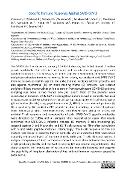Specific Immune Response Against SARS-CoV-2

Autor
Vaníková, Šárka
Musil, Jan
Vencálek, Ondřej
Holub, Michal
Bohoněk, Miloš
Beran, Ondřej
Řezáč, David
Dresler, Jiří
Kabíčková, Hana
MZ Events srl
Datum vydání
2023Publikováno v
neuvedenInformace o financování
UK//COOP
Metadata
Zobrazit celý záznamKolekce
Abstrakt
The SARS-CoV-2 coronavirus, causing COVID-19 disease, has killed almost 7 million people worldwide. For effective treatment and introduction of appropriate antipandemic measures, it is necessary to understand the development of postinfectious and postvaccination immune responses. In our study, we analysed anti-SARS-CoV-2 immune responses mainly against the spike (S) and nucleocapsid (N) proteins and also against membrane (M) or open reading frame (O) proteins. We isolated peripheral blood mononuclear cells and serum from convalescent COVID-19 patients.Sampling was done in two rounds one year apart. Most of the patients were vaccinated in between. SARS-CoV-2 seronegative donors served as controls. We used ELISpot assays to detect SARS-CoV-2-specific cells producing IFN-γ (T cells) and IgG or IgA antibodies (B cells) using peptide mixtures (S, NMO) or recombinant proteins (S, N), respectively. We applied a CEF peptide mixture (consisting of selected epitopes from influenza A virus, cytomegalovirus, and Epstein-Barr virus) to assess the antiviral T-cell response and functionality of cells. SARS-CoV-2 specific antibodies were detected by ELISAs and a surrogate virus neutralisation assay. Our results confirmed that SARS-CoV-2 infection induces: (1) memory B cells producing IgG targeted against S and N proteins and (2) T cells producing IFN-γ after stimulation with S and NMO peptide mixtures. Interestingly, the T-cell response to the CEF mixture was lower in patients than in controls. We also detected that vaccination markedly enhanced levels of memory B cells (IgG) and T cells directed against S antigen. Comparison of B-cell responses showed a correlation between the number of IgG-producing B cells, and levels of circulating IgG and neutralizing antibodies. Our study supports the importance of vaccination for immunity boosting and suggests the possibility of long-term disruption of the antiviral immune response caused by SARS-CoV-2.
Klíčová slova
SARS-CoV-2, T-cell
Trvalý odkaz
https://hdl.handle.net/20.500.14178/2034Licence
Licence pro užití plného textu výsledku: Creative Commons Uveďte původ-Zachovejte licenci 4.0 International




